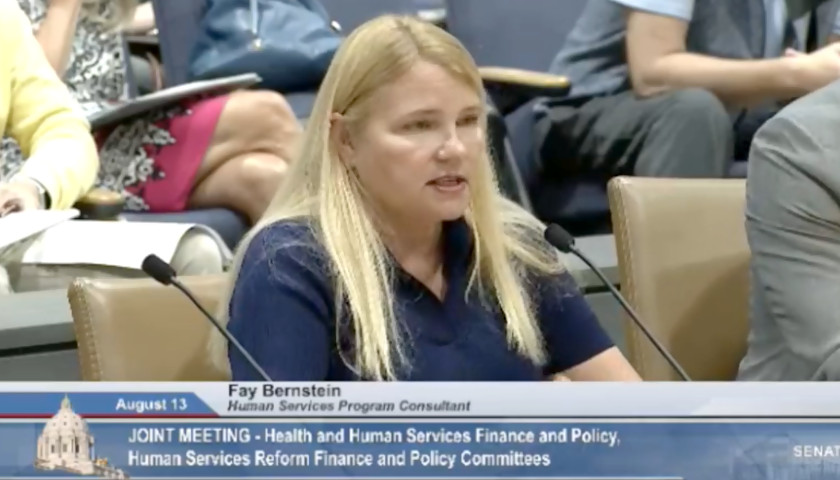The Minnesota Senate hosted Tuesday the first of what will be an ongoing series of hearings on the issues facing the state’s Department of Human Services (DHS).
The first round of hearings covered a number of topics, including fraud in the Child Care Assistance Program (CCAP), leadership turnover, recent news of $25 million in overpayments, and a general “dismissiveness” from DHS leaders.
Members of the Senate Health and Human Services Finance and Policy Committee, and the Senate Human Services Reform Finance and Policy Committee convened for the joint hearing.
“DHS has been in the news more than they should be,” State Sen. Michelle Benson (R-Ham Lake) began the more than three-hour hearing. “There have been problems in the Department of Human Services as long as I’ve been in the Legislature. Program integrity, eligibility, project management, transparency, accountability—these problems result in legislative whack-a-mole.”
“Somehow the Legislature never gets direct answers,” Benson continued. “It is our expectation that given a new governor and new commissioners there will be direct answers to these very challenging questions that we’re going to raise today and in a series of ongoing hearings.”
Benson concluded her opening remarks by observing that Minnesotans have “gotten used to DHS being an island of resistance.”
“So today is the day that the Department of Human Services decides that it can hide behind the truth in their bureaucratic wonderland or they can step forward and build a culture of transparency,” she said.
The first witness to testify was Legislative Auditor Jim Nobles, who issued a report last year confirming that millions of dollars in government payments went to fraudulent child care centers under CCAP.
“Thank you for holding this hearing. It is very important—an essential part of legislative oversight,” Nobles began, noting that DHS “consumes more of our attention and resources than any other state agency.”
“We often initiate investigations in the midst of high drama, and that is certainly true today,” Nobles continued.
He reminded legislators that his 2018 report on CCAP fraud “revealed to you that the internal controls are so lacking that it really isn’t that hard to steal money from that program if that’s your intent.”
But the most explosive moment of the hearing came when Faye Bernstein, an employee at DHS responsible for “writing, reviewing, and managing grant contracts,” told the story of how DHS bureaucrats retaliated against her.
“I find myself very well suited for this job. I have ten years of direct service experience at a treatment center, and I have an undergraduate and graduate degree in psychology, and I am a lawyer,” said Bernstein, who works in the Behavioral Health Division of DHS.
“I also want to say most importantly today that I absolutely love my job. It’s a little bit harder for me to say that today because of what I have gone through in the past several months,” she continued.
Bernstein took time off of work to testify Tuesday and said she believes it is her “responsibility to speak to you and discuss this.”
She said her division saw “some changes in management” earlier this year, right around the time she noticed some “routine” issues with compliance in contracts being sent to DHS.
“That’s why I exist at DHS. It is just my job to notice these things and to then point them out,” she explained. “The history had been that when I would point out those errors—again, typical errors—they would be handled by management. Normally my recommendations probably would be followed.”
She said, however, that she was told she “was not doing by job right” and was “too focused on compliance.”
“The retaliation did ramp up—it was ever on the increase,” Bernstein said. “It was the exact opposite response that I would have thought.”
“I have to say that within the Behavioral Health Division, there came a time when there was no one for me to go to,” she continued, and that’s when she decided to write “an email to 133 members of the Behavioral Health Division” to seek support.
“Unfortunately, within an hour I was escorted out of the building, I was banned from DHS-owned or leased property, I believe the letter said, and I was told I was being myself investigated for misconduct,” Bernstein revealed.
Her first full day back at work was August 5, which is when she was given a “letter of expectation” by her supervisors. Such letters, she believes, are “disciplinary,” since they go into personnel files and impact an employee’s “ability to get another job.”
“I just want to say that I am a good employee,” Bernstein concluded. “I feel I’m a very good employee, and the time spent on retaliation has been very much wasted time. What I was pointing out, originally, was quite routine and it was simply my job.”
Gov. Tim Walz announced Monday that he’s appointed Jodi Harpstead as Minnesota’s next DHS commissioner. She previously served as CEO of Lutheran Social Services of Minnesota.
Harpstead didn’t attend Tuesday’s hearing, but former interim commissioner Pam Wheelock spoke to lawmakers. Wheelock said during a Monday press conference that “it’s time for all of us to move on.”
Tuesday’s full hearing can be watched below:
– – –
Anthony Gockowski is managing editor of Battleground State News, The Ohio Star, and The Minnesota Sun. Follow Anthony on Twitter. Email tips to [email protected].
Photo “Faye Bernstein” by Minnesota Senate Republican Caucus.





[…] Division, claims she was retaliated against for reporting “routine” issues of compliance. While testifying before the Senate Health and Human Services Finance and Policy Committee earlier this year, Bernstein said her superiors told her that she “was not doing [her] job […]
[…] Division, claims she was retaliated against for reporting “routine” issues of compliance. While testifying before the Senate Health and Human Services Finance and Policy Committee earlier this year, Bernstein said her superiors told her that she “was not doing [her] job […]
[…] just want to say that I am a good employee,” Bernstein said during her testimony, as The Minnesota Sun reported. “I feel I’m a very good employee, and the time spent on retaliation […]